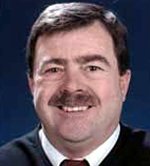7/13/2010
Indiana Appeals Court: Pulling Gun During Traffic Stop Requires CauseIndiana Court of Appeals rules that police officers should not pull their gun during a routine traffic stop.

A sheriff's deputy in Noble County, Indiana blew a case against a man suspected of driving under the influence of alcohol (DUI) after he drew his gun on the motorist without probable cause. The state court of appeals on Friday tossed the felony drunk driving conviction of Daniel C. Reinhart because of the actions of Deputy Carey Coney around 3am on August 6, 2008.
Coney had followed Reinhart's white Jeep from Route 33 to Route 100 that morning. Reinhart swerved once over the center line before pulling into a driveway. Coney proceeded farther up the road before pulling into another driveway to watch. The Jeep pulled back on the road and headed toward the police car at 26 MPH in a 55 zone. Reinhart pulled into the next driveway, parked near the cruiser and yelled at Coney. Coney ordered Reinhart to get back on the road. Coney then followed him, waiting for a well-lit area to pull the Jeep over. After they stopped, Coney ordered Reinhart out of the vehicle at gunpoint. A second officer arrived on the scene and handcuffed Reinhart. A pat-down search revealed that Reinhart had been carrying a small quantity of marijuana. Reinhart failed a portable breathalyzer test with a reading of .15, nearly twice the legal limit.
The appeals court first determined that the initial traffic stop was justified because Coney was interested in checking the driver's sobriety after seeing the swerve.
"It is well settled that police officers may stop a vehicle when they observe minor traffic violations," Judge Terry A. Crone wrote for the three-judge panel.
The question then turned to whether holding Reinhart at gunpoint or placing him in handcuffs was something more than an investigatory traffic stop. The court found, based on a video recording of the incident, that Coney had taken steps beyond what was required for his own safety.
"Reinhart gave no indication that he was armed or dangerous," Crone wrote. "Nevertheless, with the laser sight of Deputy's Coney's gun prominently fixed on him, Reinhart was ordered first to kneel with his hands behind his head for a period and then lie face down on the ground for an additional period of time while waiting for the second police officer to arrive. Reinhart was then handcuffed before he was searched twice. We believe that a reasonable person in Reinhart's position would not have believed himself to be free to leave but instead would have considered his freedom of movement to have been restrained to the degree associated with a formal arrest."
The court saw no choice but to throw out the evidence gathered after the unlawful arrest to deter police from exceeding their authority in the future.
"While we are mindful of the significant danger faced by police officers during traffic stops, we must balance the interests of officer safety with the privacy interests protected by the Fourth Amendment in requiring law enforcement to use the least intrusive means necessary to investigate a traffic stop," Crone wrote. "Under the facts presented, this was more than a minimal deprivation of Reinhart's liberty of movement necessary to confirm or dispel Deputy Coney's suspicion that Reinhart was operating a vehicle while intoxicated... Accordingly, we reverse Reinhart's convictions."
A copy of the decision is available in a 260k PDF file at the source link below.


